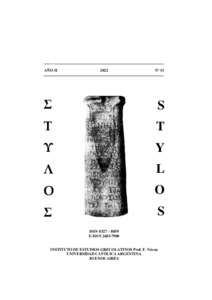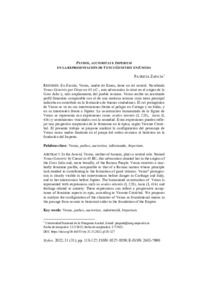Please use this identifier to cite or link to this item:
https://repositorio.uca.edu.ar/handle/123456789/15727| Título: | Pathos, Auctoritas e Imperium en la representación de venus Genetrix en Eneida | Autor: | Zapata, Patricia | Palabras clave: | PATHOS; IMPERIO ROMANO; PODER; INFRAMUNDO | Fecha de publicación: | 2022 | Editorial: | Pontificia Universidad Católica Argentina. Facultad de Filosofía y Letras. Instituto de estudios grecolatinos "Prof. F. Nóvoa" | Cita: | Zapata, P. Pathos, Auctoritas e Imperium en la representación de venus Genetrix en Eneida [en línea]. Stylos. 2022, 31. doi: 10.46553/sty.31.31.2022.p118-127. Disponible en: https://repositorio.uca.edu.ar/handle/123456789/15727 | Resumen: | Resumen: En Eneida, Venus, madre de Eneas, tiene un rol central. Nombrada
Venus Genetrix por César en 45 a.C., esta advocación la situó en el origen de la
Gens Iulia y, más ampliamente, del pueblo romano. Venus recibe un acentuado
perfil femenino comparable con el de una matrona romana cuya tarea principal
radicaba en contribuir en la formación de buenos ciudadanos. El rol protagónico
de Venus se ve en sus intervenciones frente al peligro en Cartago y en Italia, y
en su intercesión frente a Júpiter. La construcción humanizada de la figura de
Venus se representa con expresiones como oculos nitentis (I, 228), laeta (I,
416) y sentimientos vinculados con la ansiedad. Estas expresiones pueden reflejar
una progresiva aceptación de lo femenino en la épica, según Vicente Cristóbal.
El presente trabajo se propone analizar la configuración del personaje de
Venus como medio fundante en el pasaje del orden cósmico al histórico en la
fundación del Imperio. Abstract: In the Aeneid, Venus, mother of Aeneas, plays a central role. Named Venus Genetrix by Caesar in 45 BC, this advocation situated her in the origins of the Gens Iulia and, more broadly, of the Roman People. Venus receives a markedly feminine profile, comparable to that of a Roman matron whose principle task resided in contributing to the formation of good citizens. Venus‟ protagonism is clearly visible in her interventions before danger in Carthage and Italy, and in her intercession before Jupiter. The humanized construction of Venus is represented with expressions such as oculos nitentis (I, 228), laeta (I, 416) and feelings related to anxiety. These expressions can reflect a progressive acceptance of feminine aspects in epic, according to Vicente Cristóbal. We proposes to analyze the configuration of the character of Venus as foundational means in the passage from cosmic to historical order in the foundation of the Empire. |
URI: | https://repositorio.uca.edu.ar/handle/123456789/15727 | ISSN: | 0327-8859 (impreso) 2683-7900 (online) |
Disciplina: | LITERATURA | DOI: | 10.46553/sty.31.31.2022.p118-127 | Derechos: | Acceso abierto | Fuente: | Stylos. 2022, 31 |
| Appears in Collections: | STY - 2022 nro. 31 |
Files in This Item:
| File | Description | Size | Format | |
|---|---|---|---|---|
| stylos-31-portada.pdf | 130,99 kB | Adobe PDF |  View/Open | |
| pathos-auctoritas-imperium.pdf | 290,61 kB | Adobe PDF |  View/Open |
Page view(s)
51
checked on Apr 27, 2024
Download(s)
45
checked on Apr 27, 2024
Google ScholarTM
Check
Altmetric
Altmetric
This item is licensed under a Creative Commons License

